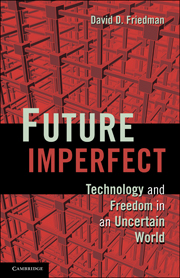Book contents
- Frontmatter
- Contents
- PART ONE PROLOGUE
- PART TWO PRIVACY AND TECHNOLOGY
- PART THREE DOING BUSINESS ONLINE
- PART FOUR CRIME AND CONTROL
- PART FIVE BIOTECHNOLOGIES
- PART SIX THE REAL SCIENCE FICTION
- 17 The Last Lethal Disease
- 18 Very Small Legos
- 19 Dangerous Company
- 20 All in Your Mind
- 21 The Final Frontier
- 22 Interesting Times
- Notes
- Bibliography
- Index
21 - The Final Frontier
Published online by Cambridge University Press: 18 August 2009
- Frontmatter
- Contents
- PART ONE PROLOGUE
- PART TWO PRIVACY AND TECHNOLOGY
- PART THREE DOING BUSINESS ONLINE
- PART FOUR CRIME AND CONTROL
- PART FIVE BIOTECHNOLOGIES
- PART SIX THE REAL SCIENCE FICTION
- 17 The Last Lethal Disease
- 18 Very Small Legos
- 19 Dangerous Company
- 20 All in Your Mind
- 21 The Final Frontier
- 22 Interesting Times
- Notes
- Bibliography
- Index
Summary
In some ways the future has been a great disappointment. When I was first reading science fiction, space travel was almost a defining characteristic of the genre, interplanetary at the least, with luck interstellar. Other technologies are well ahead of schedule; computers are a great deal smaller than most authors expected and used for a much wider variety of everyday purposes, and genetic engineering of crops is already a reality. But serious use of space has been limited to near-Earth orbit – our backyard. Even scientific activity has not gotten humans past a very brief visit to the moon. We have sent a few small machines a little farther, and so far that is about it.
One possible explanation is that the slow rate of progress is due to the dominant role of governments, itself in part a result of the obvious military applications. Another is that getting into space was harder than writers thought. The problem with the latter explanation is that we have already done the hard part. The next steps, now that we have learned to get free of the terrible drag of Earth's gravity, should be much easier. Perhaps, after a brief pause for rest and refreshment, they will be.
VIEW FROM THE BOTTOM OF A WELL
In one of Poul Anderson's more improbable science fiction stories, a man and a crow successfully transport themselves from one asteroid to another in a spaceship powered by several kegs of beer.
- Type
- Chapter
- Information
- Future ImperfectTechnology and Freedom in an Uncertain World, pp. 293 - 306Publisher: Cambridge University PressPrint publication year: 2008



